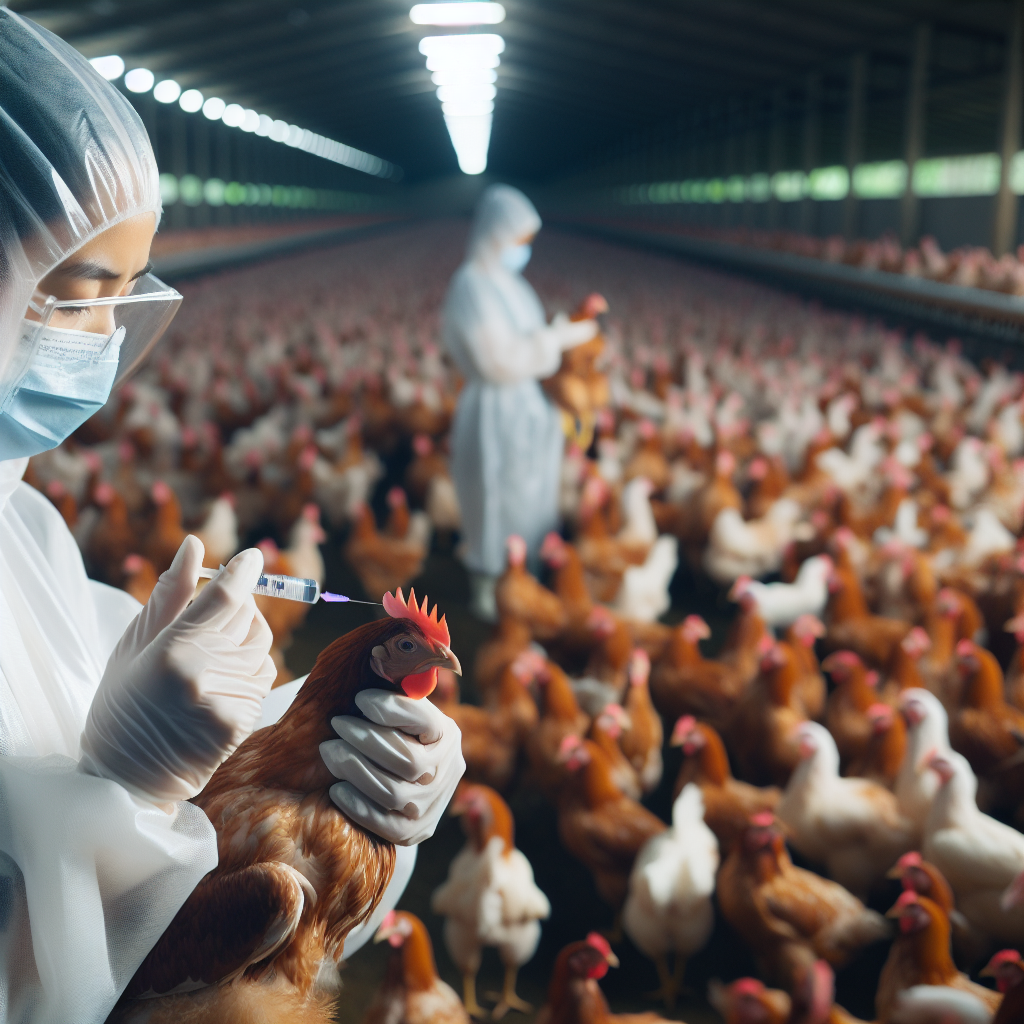If you’re venturing into the world of poultry farming and find yourself feeling overwhelmed by the complexity of regulations, worry not! You’re not alone in this journey, and there are numerous resources and organizations in your region that can provide the guidance and support you need to navigate the intricacies of poultry farming regulations. From local agricultural extension offices to industry associations, this article will explore some of the invaluable resources available to lend a helping hand and ensure your poultry farm operates in compliance with all the necessary regulations. So, no need to stress – help is just a phone call or click away!
Local Government Agricultural Offices
Contact Information
When it comes to adhering to poultry farming regulations, your local government agricultural office should be your first point of contact. They can provide you with valuable information regarding the specific regulations that apply to your region. Whether it’s contact details for the relevant departments or personnel, this office can connect you with the right people who can guide you through the regulatory process.
Services Offered
Local government agricultural offices offer a range of services to support poultry farmers in adhering to regulations. These services can include providing resources such as brochures, guidelines, and informational materials that explain the specific regulations that apply to poultry farming in your area. They may also offer workshops or training sessions to help you understand and implement these regulations effectively. Additionally, these offices may offer assistance when it comes to obtaining necessary permits or licenses for your poultry farm.
Regulatory Information
One of the key roles of local government agricultural offices is to provide up-to-date information regarding poultry farming regulations. They can help you understand the specific requirements and standards that you need to meet to comply with the regulations. This includes information on topics such as biosecurity measures, waste management, zoning restrictions, and animal welfare guidelines. By keeping you informed about the latest regulatory developments, these offices can ensure that you stay compliant and avoid any potential penalties or fines.
Poultry Farmers’ Associations
Membership Benefits
Joining a poultry farmers’ association can provide you with numerous benefits when it comes to adhering to poultry farming regulations. These associations often have membership benefits that are specifically tailored to the needs of poultry farmers. Membership benefits can include access to educational resources, discounted training programs, and networking opportunities with other poultry farmers. By becoming a member, you not only gain valuable knowledge and support but also an opportunity to stay informed about the latest regulatory changes that may impact your farm.
Networking Opportunities
Poultry farmers’ associations offer excellent networking opportunities for farmers. These associations often conduct regular meetings, conferences, and workshops where you can connect with other poultry farmers in your region. Networking with fellow farmers can be incredibly valuable when it comes to navigating poultry farming regulations. You can learn from their experiences, exchange best practices, and find support in tackling regulatory challenges. By building a strong network within the industry, you can stay up to date with the latest regulatory information and learn from the collective knowledge of seasoned poultry farmers.
Regulatory Support
Poultry farmers’ associations understand the complexities of poultry farming regulations and are dedicated to providing regulatory support to their members. They can offer guidance on how to interpret and comply with the regulations, ensuring that you stay on the right side of the law. These associations often have experts or consultants who are well-versed in the regulations and can provide advice tailored to your specific circumstances. Having access to specialized support can make a significant difference in ensuring that your farm operates in full compliance with the regulations.
Extension Services
Agricultural Extension Offices
Agricultural extension offices play a crucial role in providing support and guidance to poultry farmers. These offices are typically run by agricultural universities or organizations and are dedicated to serving the needs of farmers. They offer a wide range of services, including information and education on poultry farming regulations. If you have questions or need clarification on specific regulations, agricultural extension offices can be a valuable resource. They can help you understand the requirements and provide guidance on how to comply effectively.
Training Programs
To help poultry farmers adhere to regulations, agricultural extension offices often offer training programs. These programs are designed to provide farmers with the knowledge and skills they need to operate in accordance with the regulations. Training sessions can cover topics such as proper biosecurity practices, disease prevention measures, record-keeping, and legal requirements. By participating in these programs, you can enhance your understanding of the regulations and learn practical strategies for compliance.
Regulatory Assistance
Agricultural extension offices also offer regulatory assistance to poultry farmers. They can help you navigate the regulatory landscape by providing information on permits, licenses, and other documentation required for your poultry farm. Additionally, they may offer guidance on how to develop and implement an effective farm management plan that aligns with the regulations. If you encounter any challenges or have specific questions regarding the regulations, agricultural extension offices can offer guidance and support.
Regional Department of Agriculture
Contact Information
The regional department of agriculture is a valuable resource for poultry farmers seeking guidance on regulations. They are responsible for enforcing and overseeing agricultural regulations in your region. It is essential to have their contact information readily available so that you can reach out to them whenever you have questions or concerns regarding poultry farming regulations. Whether it’s via email, phone, or in-person visits, the regional department of agriculture can provide you with the guidance you need.
Regulatory Guidelines
The regional department of agriculture can provide you with comprehensive regulatory guidelines specific to poultry farming. These guidelines will outline the legal requirements and expectations for operating a poultry farm in your region. From zoning restrictions to biosecurity measures, these guidelines will cover all the key aspects that you need to be aware of to ensure compliance. By familiarizing yourself with these guidelines and regularly checking for updates, you can maintain a good understanding of the requirements and stay in compliance with the regulations.
Technical Assistance
In addition to providing regulatory guidelines, the regional department of agriculture can offer technical assistance to poultry farmers. This assistance can include on-site visits to assess your farm’s compliance with the regulations and provide recommendations for improvement. They can also provide guidance on issues such as waste management, pest control, and animal welfare. By availing yourself of their technical expertise, you can ensure that your farm meets the necessary standards and operates in a manner that minimizes environmental and health risks.
Industry Consultants
Expertise and Experience
Industry consultants specializing in poultry farming regulations can be a valuable asset for farmers. These consultants have the expertise and experience necessary to help you navigate the complexities of regulatory compliance. They stay up to date with the latest regulatory changes and can provide you with personalized advice based on your specific situation. Whether you are a novice poultry farmer or an established operator, industry consultants can offer guidance tailored to your needs, ensuring that you stay in adherence to the regulations.
Regulatory Compliance Consulting
One of the primary services offered by industry consultants is regulatory compliance consulting. They can assess your current operations and identify any areas in which you may be out of compliance with the regulations. From there, consultants can develop a customized plan to help you rectify these issues and ensure that your farm meets all the necessary regulatory requirements. Their in-depth understanding of the regulations can save you time and effort while helping you maintain a strong compliance record.
Guidance on Best Practices
Industry consultants can also provide guidance on best practices related to poultry farming regulations. They can offer insights on efficient farm management techniques, biosecurity protocols, and disease prevention measures. By implementing these best practices, you can not only ensure compliance with the regulations but also enhance the overall productivity and sustainability of your poultry farm. Consultants can help you optimize your operations while prioritizing the health and welfare of your animals, ensuring that your farm meets or exceeds the required standards.
Veterinary Services
Local Veterinary Clinics
Poultry farming regulations often have specific requirements related to animal health and welfare. Local veterinary clinics can play a crucial role in helping you stay compliant with these regulations. Having a trusted veterinarian by your side ensures that you have access to professional guidance and ongoing support for maintaining the health of your flock. Regular check-ups, vaccinations, and disease management strategies are essential for ensuring compliance with animal health regulations, and a local veterinary clinic can assist you in meeting these requirements.
Animal Health Regulations
Understanding and adhering to animal health regulations is fundamental for poultry farmers. Local veterinary clinics can provide you with detailed information on the specific regulations that apply to your region. They can guide you on issues such as vaccinations, medication use, and quarantine protocols. Veterinary clinics are well-versed in the latest guidelines for poultry health and can recommend preventive measures to minimize the risk of diseases and protect the welfare of your flock. By working closely with a local veterinary clinic, you can ensure that your farm stays compliant with animal health regulations.
Disease Prevention Measures
Preventing the spread of diseases is of utmost importance in poultry farming. Local veterinary clinics can help you implement effective disease prevention measures to mitigate risks and protect your flock. They can advise you on biosecurity protocols, proper sanitation practices, and assist in developing a disease management plan. By following their recommendations and staying proactive in preventing diseases, you can not only ensure compliance with regulations but also safeguard the health and productivity of your poultry farm.
Educational Institutions
Agricultural Colleges
Agricultural colleges are invaluable resources for poultry farmers seeking guidance on regulations. These institutions offer specialized education and training programs that cover various aspects of poultry farming, including regulatory compliance. Agricultural colleges often have faculty members with expertise in poultry farming regulations, allowing them to provide comprehensive guidance to farmers. By reaching out to agricultural colleges in your region, you can access their resources, attend workshops or seminars, and connect with experts who can help you navigate the regulatory landscape.
Research Centers
Research centers associated with agricultural colleges or universities can provide valuable insights into poultry farming regulations. These centers often conduct research projects focused on understanding and improving agricultural practices, including compliance with regulations. Their research findings can help farmers stay informed about the latest scientific advancements and their implications for regulatory compliance. Research centers may also have specialized personnel who can offer guidance and support in understanding and implementing specific regulations relevant to poultry farming.
Educational Resources on Regulations
Educational institutions, particularly agricultural colleges and research centers, typically develop educational resources dedicated to helping farmers understand and adhere to regulations. These resources can include publications, fact sheets, online courses, and workshops that cover various topics related to poultry farming regulations. By utilizing these resources, you can enhance your knowledge of the specific regulations that apply to your farm and gain insights into the best practices for compliance. Educational institutions are committed to supporting farmers and can be a valuable source of information and guidance.
Environmental Protection Agencies
Regulatory Compliance
Environmental protection agencies play a crucial role in ensuring that poultry farms comply with environmental regulations. These agencies are responsible for enforcing and monitoring compliance with laws related to waste management, water quality, and other environmental aspects of poultry farming. It is essential to familiarize yourself with the specific regulations enforced by your local environmental protection agency and reach out to them for guidance if needed. By proactively working with these agencies to ensure compliance, you can protect the environment and maintain the sustainability of your farm.
Waste Management Guidelines
Proper waste management is a key aspect of poultry farming regulations and plays a vital role in minimizing the environmental impact. Environmental protection agencies can provide you with specific waste management guidelines that detail the requirements for handling, storing, and disposing of poultry waste. These guidelines often cover topics such as manure management, composting, and nutrient runoff prevention. By following these guidelines, you can manage your farm’s waste in an environmentally responsible manner, reducing the potential for ecological harm and ensuring compliance with relevant regulations.
Environmental Impact Assessments
In certain regions, environmental impact assessments may be required for new or expanding poultry farms. Environmental protection agencies can guide you through the assessment process, ensuring that you understand the requirements and fulfill all necessary obligations. An environmental impact assessment involves evaluating the potential environmental effects of your farm and developing mitigation strategies to minimize any negative impacts. By collaborating with the environmental protection agency throughout this process, you can ensure that your farm operates sustainably and in full compliance with environmental regulations.
Poultry Industry Publications
Magazines and Journals
Poultry industry publications are an excellent resource for staying informed about the latest regulatory developments. Magazines and journals dedicated to poultry farming provide insights into industry trends, innovations, and regulatory changes. They often feature articles written by experts and professionals who share their knowledge and experiences related to poultry farming regulations. By subscribing to these publications, you can receive regular updates and gain valuable insights on how to ensure compliance with the ever-evolving regulatory landscape.
Online Resources
The internet has opened up a vast array of online resources that can help poultry farmers understand and adhere to regulations. Various websites, online forums, and blogs cater specifically to the needs of poultry farmers. These online resources provide a wealth of information on topics such as regulatory guidelines, best practices, and case studies. They can be valuable sources of practical advice and guidance, allowing you to learn from the experiences of others and stay informed about changes in poultry farming regulations.
Updates on Regulatory Changes
Poultry industry publications play a crucial role in keeping farmers informed about regulatory changes. They often provide timely updates on any amendments or new regulations that may impact poultry farming. By regularly reading these publications, you can stay ahead of the curve and be proactive in adjusting your farm’s operations to ensure compliance. Additionally, publications may offer expert analysis and interpretation of these changes, enabling you to understand how they specifically apply to your farm.
Farmers’ Markets and Agri-Tourism Associations
Local Market Regulations
For poultry farmers engaged in direct marketing, understanding local market regulations is essential. Farmers’ markets often have specific rules and regulations that must be followed to sell your poultry products. These regulations can include requirements related to food safety, labeling, and packaging. Farmers’ markets and local agri-tourism associations can provide you with information on the specific regulations that apply to selling poultry products at these venues. By adhering to these regulations, you can build consumer trust and ensure that your products meet the necessary quality standards.
Farm Tours and Visitor Guidelines
If your poultry farm offers farm tours or welcomes visitors, it is vital to have clear guidelines in place. Agri-tourism associations can provide you with resources and recommendations on how to ensure visitor safety, maintain biosecurity, and comply with relevant regulations. They can guide you in developing protocols for visitor interactions, proper sanitation practices, and educational activities. By following these guidelines, you can create a positive and educational experience for visitors while prioritizing the well-being of your flock and adhering to regulations.
Certification Programs
Agri-tourism associations and farmers’ markets often have certification programs in place to ensure that participating farms meet specific standards. These programs can include certifications related to organic farming practices, animal welfare, or food safety. By participating in these certification programs, you can demonstrate your commitment to quality and compliance with regulations. The associations and markets can provide you with the necessary information and guidance to apply for and successfully achieve these certifications, enhancing the reputation and marketability of your poultry farm.




